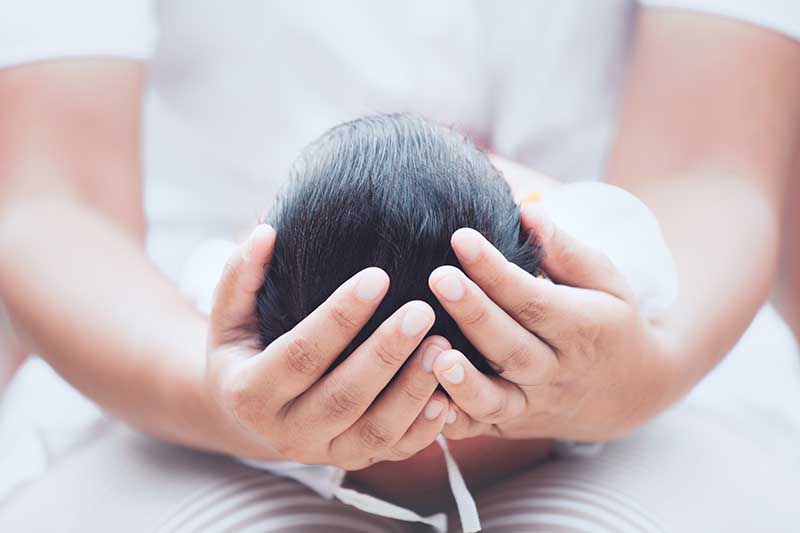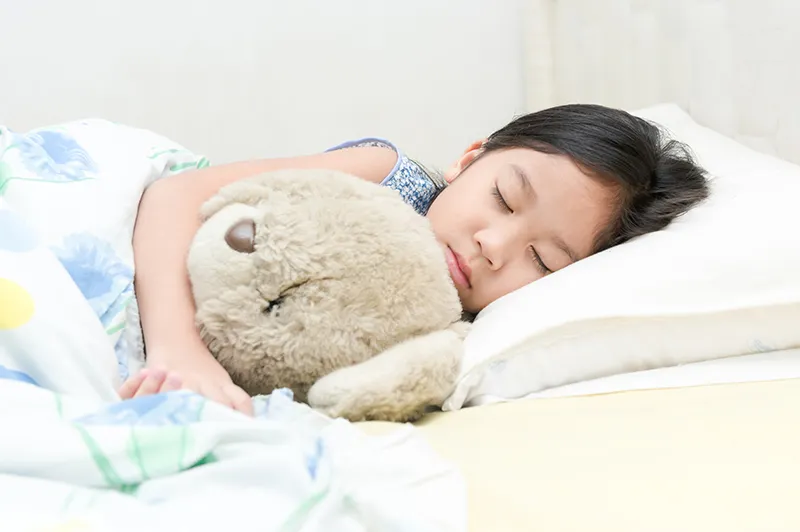Families For Life | About Sleep-Babies

DID YOU KNOW?
Cradle cap is the oily, scaly crust that babies sometimes get on their scalps, in their body folds and on their torsos. Although cradle cap looks uncomfortable, it doesn’t usually bother your baby.
READ MORE

Sleep is important for health and wellbeing at every age, but babies, children and adults sleep differently. The amount of time we spend in light and deep sleep varies depending on age. Babies are biologically programmed to sleep more lightly and wake more often than adults.
Why sleep?
Babies, children and adults all need sleep, and we spend about one-third of our lives asleep.
Children and adults need to get enough sleep so they can play, learn and concentrate during the day. A lot happens in our bodies and brains while we sleep. For example, when it’s dark, children’s bodies produce growth hormone. This is one of the reasons why young children spend so much time sleeping – their bodies and brains have so much growing to do.
Light sleep and deep sleep
At every age, normal sleep involves cycles of:
light sleep, also called rapid eye movement (REM) sleep
deep sleep, also called non-rapid eye movement (NREM) sleep
When you’re in light sleep, sometimes you might not even realise you’re asleep. You can wake easily from light sleep. Light sleep is when you dream.
Deep sleep is a lot more peaceful and restful. It’s thought that deep sleep is the time when we grow and heal. Someone in deep sleep is hard to wake up and might feel quite drowsy when they do wake up.
Sleep cycles
Each night everyone – grown-ups and children – moves through repeating cycles of deep and light sleep.
Typically, more of our sleep in the early part of the night is deep sleep (about 80%). Then about halfway through our normal-length sleep, our sleep cycle flips. By morning, about 80% of our sleep is light sleep.
This is why it’s easier to be disturbed towards the end of a sleep.
Sleep cycles in babies and children
Cycles of deep and light sleep last 30-50 minutes in babies, then gradually increase in length across childhood.
Some babies and children fall deeply asleep very quickly. Others sleep lightly, fidgeting and muttering for up to 20 minutes, before getting into deep sleep.
Children usually wake briefly at the end of each sleep cycle. This is a normal part of healthy sleep – all children do it. Some children call out when they wake and need help settling again, but independent sleepers put themselves back to sleep. Not all parents hear their children when they wake up.
Sleep cycles in adolescence and adulthood
In adolescence and during the adult years, each cycle of deep and light sleep lasts about 90 minutes.
Each cycle ends in a brief awakening, and these can happen several times throughout the night. These awakenings don’t normally disrupt our sleep, and we usually aren’t even aware of them. If things haven’t changed, we’ll normally go straight back to sleep – but if things have changed around us, we’re uncomfortable or anxious, our pillow is missing, or we’re disturbed by a noise, we might wake fully.
How sleep cycles change over time
The amount of time we spend in each type of sleep varies depending on our age.
At birth, full-term babies spend about half their sleeping time in light sleep and have shorter sleep cycles than adults. This means that babies are biologically programmed to sleep more lightly and have more awakenings than adults.
The amount of light sleep in our sleep cycle decreases with age. By three years of age, 33% of sleep is light. By the time we’re around 13 years old, only about 20% of our sleeping time is light sleep.
When we sleep
It takes time to consolidate most of our sleep into the night-time. Babies and children vary in their sleep habits and sleep needs, just like adults.
Under 6 months
Newborns sleep on and off through the day and night.
Babies aged 3-6 months might start moving towards a pattern of 2-3 daytime sleeps of up to two hours each. They might still wake at least once at night.
At 6-12 months
From about six months, babies have their longest sleep at night.
Between 6 and 12 months, most babies are in bed between 6 pm and 10 pm. They usually take less than 30 minutes to get to sleep (but about 10% of babies take longer).
Most babies can sleep for a period of six hours or more at night and are waking less. About 60% will wake only once during the night and need an adult to settle them back to sleep. About one in 10 will call out 3-4 times a night. More than a third of parents say their babies have problems with sleep at this age.
Around 85-90% of babies aged 6-12 months are still having daytime naps. These naps usually last 1-2 hours. Some babies sleep longer, but up to a quarter nap for less than an hour.
Waking at night is partly related to children’s worry about being separated from a parent or parents. Overcoming this worry is normal and necessary for all children as a step towards becoming more independent at night
From 12 months
From this age, children tend to sleep better. Some toddlers start to resist going to sleep at night, preferring to stay up with the family – this is the most common sleep problem reported by parents. It peaks around 18 months and improves with age.
Less than 5% of two-year-olds wake three or more times overnight.
From 3 years
Children aged 3-5 years need around 11-13 hours of sleep a night. Some might also have a day nap that lasts for about an hour. From about 5 years of age, children no longer need a day nap.
Children aged 5-11 years need 10-11 hours sleep a night. They’re usually tired after school and might look forward to bedtime from about 7.30 pm.
From 10 years
Children entering puberty generally need about 8-10 hours of sleep a night to maintain the best level of alertness during the day.
Changes to the internal body clock or circadian rhythm during adolescence mean it’s normal for teenagers to want to go to bed later at night – often around 11 pm or later – then get up later in the morning.
Over 90% of adolescent children don’t get the recommended amount of sleep on school nights. Getting enough good-quality sleep is important during this period, because sleep is vital for thinking, learning and concentration skills.
Daytime sleepiness, difficulty getting to sleep or staying asleep, or finding it hard to wake up in time for school are all common experiences in adolescence. Over 45% of teenagers report daytime sleepiness at least once a week.
© raisingchildren.net.au, translated and adapted with permission
Explore more